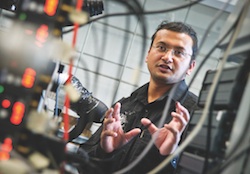Nov 8 2013
UT Arlington researchers are exploring a better method for initiating certain gene therapies that could better fight the sight-deteriorating disease retinitis pigmentosa.
 Samarendra Mohanty, Assistant Professor of Physics
Samarendra Mohanty, Assistant Professor of Physics
The National Institutes of Health is funding the research.
Samarendra Mohanty, assistant professor of physics, expects to receive a total of $384,269 over the next two years from the NIH’s National Institute of Neurological Disorders and Stroke. His work involves using near-infrared ultrafast laser beam to deliver genes that allow expression of light-sensitive proteins, called opsins, in specific cells. That proteins’ expression allows researchers to influence neural activity through optical or light stimulation – a technique known as optogenetics.
In the past, the genes have been delivered to cells by virus. That method can have drawbacks, such as immune responses, in addition to the benefits. In Mohanty’s method, a laser beam creates a transient sub-micrometer size hole, which allows for the gene encoding the proteins to permeate through the cell membrane. It can limit the risk of immune response, as well as delivering larger genes than viral methods, he said.
Digant Dave, UT Arlington associate professor of bioengineering at UT Arlington, is the co-investigator on the new grant.
“Our minimally invasive near-infrared method can deliver DNA and other impermeable molecules effectively where you want it and only where you want it,” said Mohanty. “For example, in retinitis pigmentosa, only peripheral retina begins to lose light sensitivity due to loss of photoreceptors. This is where a laser can deliver the genes, making those neurons respond to light again. With a virus, the genes will be delivered everywhere, causing complications in areas already working fine.”
Optogenetic stimulation also holds promise for influencing neurons in the brain. Scientists, including Mohanty’s research group, are researching ways it could be used to understand how the brain works or to intervene in case of neurological disorders or to affect behavior.
Ultimately, Mohanty’s team has a goal of creating all optical, or light-based, control and monitoring of cell activity. So, in addition to the light-assisted delivery of genes, the researchers also will work on refining methods for stimulating the neural activity using near-infrared and visible light. Some of those methods are described in a recently published paper called “Fiber-optic two-photon optogenetic stimulation,” which appeared in the journal Optics Letters.
Mohanty’s lab at UT Arlington also will use a method called phase-sensitive interferometry, to monitor the changes in neurons that result from the activation by light. The interferometry method is called “label-free” because unlike fluorescence, it uses the change in behavior of light rays, rather than staining, to track changes at the sub-nanometer level.
"Dr. Mohanty’s proven track record of exploration in the area of optogenetics has earned him this support from the National Institutes of Health,” said Alex Weiss, chairman of the College of Science’s physics department. “We are pleased to see this promising research supported and look forward to seeing the exciting research findings that this support will make possible.”
The University of Texas at Arlington is a comprehensive institution of more than 33,300 students and more than 2,200 faculty members in the heart of North Texas. It is the second largest school in The University of Texas System. Visit www.uta.edu to learn more.
Source: http://www.uta.edu/